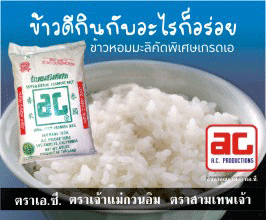LAW CORNER WITH JC 15 ธันวาคม 2561
LANDLORD-TENANT ISSUES
In this week’s article, I will be answering an email question regarding a common landlord-tenant issue surrounding security deposits on apartment rentals. Most landlords will require a security deposit upon signing the agreement to rent or lease, therefore, it is your best interest as a renter to know your rights.
This question comes from Khun Mai, from Northridge, CA:
Q: “Khun Joey: I having been renting an apartment for about 2 years now here in Northridge. I told my landlord last week that I will be moving out so I asked for my security deposit back. He told me that I was not getting that back. Can he hold my security deposit and not return it to me?”
SECURITY DEPOSIT & REFUNDS
A “Security Deposit” is an amount that, in addition to rent (i.e. first month’s rent,, application fee, etc), is demanded by the landlord as protection to cover risks against a defaulting tenant and/or one that causes damages. Under California law, security deposits are refundable with certain, limited circumstances. A rental agreement cannot say that a security deposit is “nonrefundable” because when a tenant moves out, the landlord must refund the security deposit back to the tenant. The only exceptions or circumstances where the landlord can refuse to refund the security deposit are when the landlord uses this security deposit to:
(1) Cover unpaid rent by the tenant.
EX: Tenant moves out and fails to pay his last month rent. The landlord can use the security deposit to cover this unpaid rent. If the amount of security exceeds rent, then the landlord must refund the difference. On the other hand, if the amount of security does not satisfy rent, then the landlord may file an action to demand payment of the remaining balance.
(2) To clean the rental unit once the tenant moves out (but only to make the unit as clean as it was when the tenant first moved in).
EX: When the tenant moves out, he leaves bags of trash and dirty dishes in the sinks. The landlord can deduct from the security deposit an amount equal to pay for cleaning of the dishes and removal of the bags of trash.
(3) To make repairs caused by the tenant that exceed normal wear and tear.
EX: After the tenant moves out, the landlord enters the apartment and notices broken windows and broken doors. This damage undoubtedly exceeds normal wear and tear, and therefore, the landlord can use the security deposit to pay for needed repairs – to buy new windows, new doors and any costs associated with replacement services.
(4) If the agreement allows it, for the cost of restoring/replacing furniture, keys or other personal property items, other than because of normal wear and tear.
EX: Let’s say when the tenant initially rented the apartment, the apartment was furnished with a couch, a bed, and refrigerator. In the rental agreement, the contract obligates the tenant to cover any costs if restoring or replacing damaged items. When landlord inspects the apartment after the tenant moves out, he notices that the couch is torn, and the refrigerator door is broken and unlatched. The landlord may use the security deposit to fix or buy a new couch.
AMOUNT OF SECURITY?
California law limits the amount of security a landlord can require a tenant to deposit.
For Unfurnished Apartments: The security deposit cannot exceed 2 month’s amount of rent.
For Furnished Apartments: The security deposit cannot exceed 3 month’s amount of rent.
EX: Tenant agrees to rent a furnished apartment from Landlord for $2,500 per month. The maximum security the Landlord can demand from the Tenant is $2,500 x 3 = $7,500. (If there is a waterbed, the Landlord can demand $2,500 x 3.5 = $8,750).
A: Now to answer Khun Mai’s email question – If you do not owe the landlord any past rent, the landlord must return your security deposit (minus any amount necessary to repair damages you caused that is beyond “normal wear and tear”). In order to increase your chances of getting your security deposit back, I would recommend that you broom clean your apartment and make any repairs that are necessary prior to vacating the property. Be sure to throw away excess trash, and remove any of your personal belongings.
If you still have questions, or need assistance, please contact my office at (818) 846-5639, or my Thai direct line at (818) 505-4921. Also, if you have any questions that you would like to be answered in future articles, please email me at: JC4LAW@HOTMAIL.COM or visit my website at: WWW.JC4LAW.COM for general information regarding this and many other topics in Business, Property and Family Law. Like and follow me on FACEBOOK at: https://www.facebook.com/ThaiAttorney for the most recent updates in the law!
Disclaimer: The information contained herein have been prepared for informational purposes only and are not to be considered legal advice unless otherwise specified. All opinions expressed are those of the author and in no way shall be associated with Thai LA Newspaper. If you have a specific question regarding your personal case, please contact the Law Offices of Joseph Chitmongran for a full consultation.


































